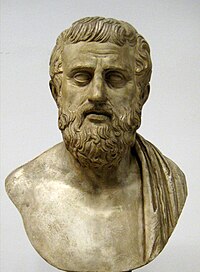List of extant ancient Greek and Roman plays
These include the comedies of Aristophanes and Menander, the tragedies of Aeschylus, Sophocles and Euripides, and the Roman adaptations of Plautus, Terence and Seneca.
They range from the 472 BC tragedy The Persians, written by the Greek playwright Aeschylus, to Querolus, an anonymous Roman comedy from late antiquity.
Ancient Greek tragedies were most often based upon myths from the oral traditions, exploring human nature, fate, and the intervention of the gods.
[5][6][7][8][9] Satyr plays feature mythological-heroic stories in a style of language similar to that of the tragedies, while sharing with comedy plots, titles, themes, characters, and happy endings.
Mimes were a popular, informal type of entertainment in which a small group of actors portrayed a short situation from everyday life in the lower levels of society, in a humorous or farcical manner.
Roman comic dramatists made several structural changes, such as the removal of the previously prominent role of the chorus as a means of separating the action into distinct episodes and the addition of musical accompaniment to the plays' dialogue.








